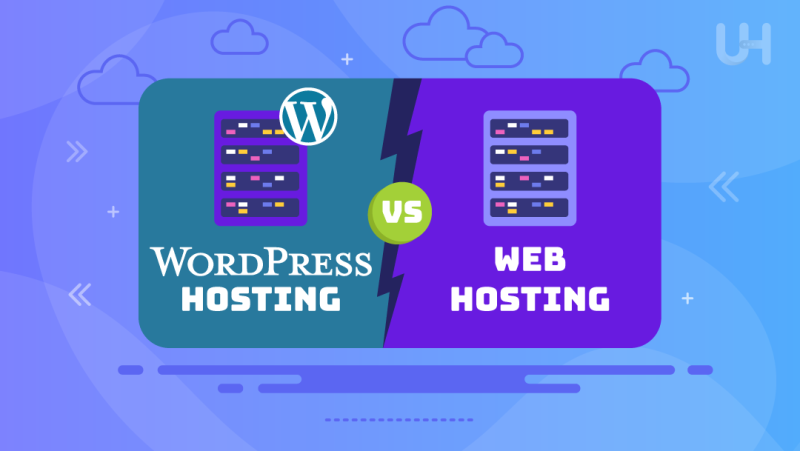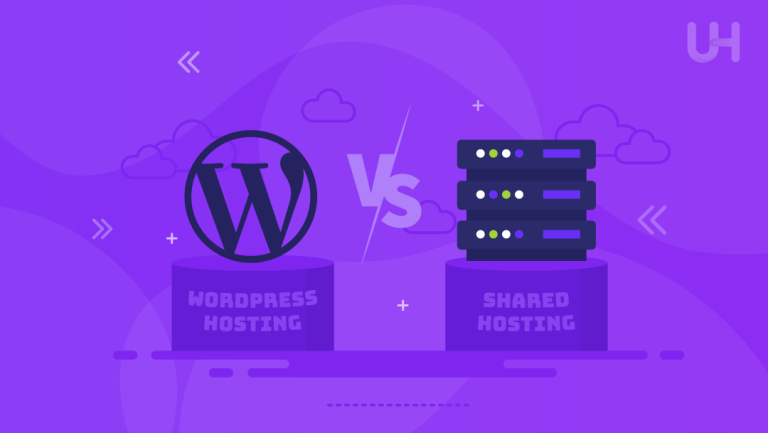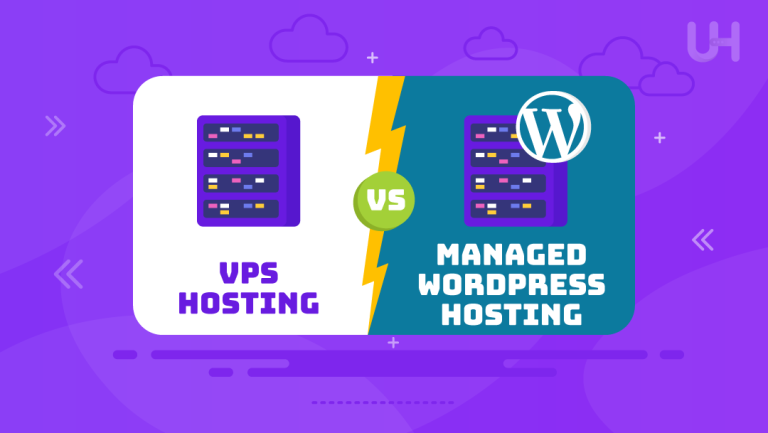One major decision you will ever make while launching a website is the hosting service for your new site. There are many available options, and two terms needing clarification are WordPress Hosting vs Web Hosting. These two terms are very similar in relation but have different purposes and features.
In this post, we will discuss WordPress Hosting vs Web Hosting in detail, along with their pros and cons—focusing on different types of hosting—to help you better understand the main differences and, hence, make a decision about your online presence.
What is WordPress Hosting?
WordPress hosting is a form of web hosting specifically designed to improve the performance of sites built with this content management system.
WordPress is the most used CMS worldwide and hosts approximately 43% of all websites. Many web hosting companies offer WordPress hosting services.
Depending on the provider, WordPress hosting can be categorized differently: shared WordPress hosting, VPS WordPress hosting, or cloud WordPress hosting. The main difference between standard hosting and managed WordPress hosting is the addition of additional features like managed WordPress hosting plans that come with preinstalled plugins for better website functioning.
Additionally, specialized tools could deal with more than one WordPress website. Many plans offer a multisite feature whereby users can manage several sites from one dashboard.
Advantages
- Performance and Speed Optimized: Optimized WordPress hosting environments for WordPress mean faster page load times and improved performance.
- Automatic Updates: Most WordPress hosting services have auto-updates, themes, and plugins in your WordPress core. This would keep you updated about the latest features and security patches that come through and hence reduce the risk of vulnerabilities.
- Enhanced Security Features: Most WordPress hosting plans include enhanced security with malware scanning tools and firewalls; they also conduct periodic security audits. This will help you automatically avoid common dangers that are aimed at WordPress websites.
- Expert WordPress Support: At the heart of specialized WordPress hosting providers is a support foundation laid by expert people who know everything about the platform. This simply means your problems specific to WordPress will be addressed more timely and efficiently.
- Pre-Installed WordPress Environment: Most WordPress hosting plans come with this environment pre-installed, so you do not have to install it in detail. This will save time and simplify the initial setup process, especially for beginners who want to dive in and start working.
Disadvantages
- Higher Costs: Most of the time, WordPress hosting is more expensive than general website hosting. With this extra functionality and specialized support comes a premium that may not be cost-effective for small or hobby sites.
- Limited only to WordPress Websites: It has plans specifically for WordPress websites. Any other kind of site one may need to host, or other content management systems, might not work with this type of hosting.
- Less Control Over Server Settings: WordPress hosting providers control server settings to optimize performance and security. While this benefits most users, it can be a drawback for those requiring complete control over server configurations.
- Additional Costs Possible: Although the base product includes many current features, premium plugins, themes, and other resources are extra. These add up quickly to increase the overall cost of keeping your website running.
- Resource Limitations on Shared Plans: Most shared WordPress hosting plans have resource limitations involving restricted bandwidth instead of unlimited bandwidth and storage. These limitations affect the performance of your website in cases of sudden traffic spikes or if you run resource-intensive applications.
Types Of WordPress Hosting
Secure WordPress Hosting
Secure WordPress hosting plan protects your website against online threats through advanced security features such as firewalls, malware scanning, and different types of SSL certificates. Its firewalls block malicious traffic while scanning malware detects and eliminates harmful software. The SSL certificates will add an extra layer of protection by encrypting data exchanged between your site and visitors for enhanced security and trust. Also included are daily WordPress backups and regular security audits, ensuring you can quickly restore your site and keep it updated with the newest security patches.
Fast WordPress Hosting
A Fast WordPress hosting plan focuses on enhancing your website’s speed and performance. Content delivery networks (CDNs) and advanced caching also characterize this hosting. CDN copies the data and stores it in multiple locations globally, which reduces load time, while website caching reuses previously accessed data for faster page delivery. Moreover, solid-state drives (SSDs) provide server resources that enhance site speed because of fast data access and traffic handling.
Enterprise WordPress Hosting
Enterprise WordPress hosting plan is a service targeting large organizations’ high-traffic sites with performance, scalability, and reliability expectations. It helps scale resources, bandwidth, and storage while dealing with growth and surging traffic. Dedicated server resources prevent performance problems from other sites; high availability features ensure that operations never stop when hardware failures happen.
Enhance Your WordPress Site with Premium Hosting!
Ready to take your WordPress website to the next level? Discover the unparalleled performance, security, and support of WordPress Hosting with UltaHost. With tailored features and expert management, your site will run faster and smoother than ever.
What is Web Hosting?
Web hosting is a process by which websites become directly accessible to the Internet. When buying a hosting plan, the website owner purchases part of the provider’s server space to hold files for their website.
It offers different variants of web hosting to serve many needs, whether you are a beginner or advanced user, use a certain CMS or site builder, or have a small or large website.
Other than the occupational space on a server that a website has, most hosting services provide extra features, including domain name registration, email hosting plans, and backup. Web hosting also provides a myriad of security measures that ensure not only the safety of the website from varied misuse but also the prevention of data loss.
The overall pricing for web hosting makes it more affordable. It provides a reliable and secure solution for getting a website online and constantly available to users.
Advantages
- Cost Comparison: Standard hosting plans are often more budget-friendly than specialized or cheap WordPress hosting. However, evaluate what you’re getting to gauge each plan’s value.
- Flexibility in Hosting: Standard web hosting allows flexibility when hosting different platforms or custom websites. In this way, one can easily manage various websites from a single hosting account.
- Server Configuration Control: More importantly, with VPS or dedicated plans in standard hosting, you have more server configuration control. This would mean customization at will in accordance with specific needs or development tastes.
- Caching and Optimization Choice: The flexibility of choice and configuration in relation to caching and optimization tools in standard hosting allows for a much greater scope for a customized performance setup.
Disadvantages
- Less Specialized Support: Less specialized web hosting providers can lack experts who are specially trained to deal with problems related to WordPress or other CMS platforms. This can consequently lead to longer resolution times and less focused support for WordPress-specific problems.
- Limited WordPress Support: Unlike dedicated WordPress hosting, on regular shared web hosting, all the updates to WordPress—be it plugins, themes, or core software—are done by users themselves. This can present difficulties in site security maintenance and eventual updating without specialized support.
- Non-Optimized Servers: Most general web hosting involves regular servers, calling in the spectrum of CMSs and site builders—none of which is particularly optimized for WordPress. This could be behind possible performance issues and slower site speeds, as users miss out on built-in WordPress performance plugins available in specialized WordPress hosting environments.
Types Of Web Hosting
A shared web hosting plan involves hosting multiple websites on a single physical server, with each site allocated resources from a virtual partition. This cost-effective option is ideal for small sites with low traffic. It’s perfect for beginners or small business owners who prefer not to handle server management. The hosting provider manages server monitoring, updates, and backups, relieving users of technical responsibilities and ensuring basic maintenance is handled efficiently.
VPS Hosting
VPS, short for Virtual Private Server, gives you all the functionality of shared hosting but with some serious dedication to the user. Though a VPS hosting plan still technically hosts many accounts on a single server, there will be only a few others of the same kind. The users then have much higher control and power compared to shared hosting. It offers more performance and further customization because of the dedicated resources and increased control over the server settings. So, it suits medium to high traffic requirements.
Dedicated Hosting
Dedicated website hosting gives full access to a single physical server with no resource sharing. Within this single-tenant server setup, the user has full control of the server’s resources, storage, and configuration. The server can be administered via root access or through a web-based control panel. This will help the high traffic volume going to websites or applications that heavily need robust performance and customization; it is ideal and gives high control and reliability.
Cloud Hosting
Cloud hosting is a method that uses a network of remote virtual and physical servers to host your account and website(s). It is a distributed approach, so the flexibility and scalability associated with this technology are enhanced. Resources can be adjusted per demand in this case. Cloud hosting is a resource-rich, scalable solution that is less managed than other hosting forms, making it suitable for websites that need very high uptimes and dynamic resource scaling.
Managed Hosting
Managed hosting is the company that handles all the technical aspects related to the hosting of your servers, right from setting them up to keeping a tab on their maintenance, security, and backup. This option goes very well with someone who does not want to deal with the technicalities of hosting and come up with a website or an application. Managed hosting provides peace of mind by knowing that technical requirements are looked after most appropriately through professional management and support.
Learn the differences between Managed vs Unmanaged Hosting here!
Differences Between Web Hosting vs WordPress Hosting
Here’s a table highlighting the key differences between WordPress Hosting vs Web Hosting:
| Feature | Web Hosting | WordPress Hosting |
| Purpose | General hosting for various types of websites | Optimized specifically for WordPress sites |
| Server Configuration | Standard server settings, suitable for multiple CMS | Configured for optimal WordPress performance |
| Support | General support for various platforms | Specialized support for WordPress issues |
| Maintenance | Users manage updates, security, and backups | Managed updates, security, and backups included |
| Performance Optimization | Basic performance features | Advanced caching and performance enhancements |
| Custom Features | A broad range of features not specific to WordPress | WordPress-specific tools and plugins |
| Ease of Use | Suitable for users familiar with multiple platforms | Tailored for ease of use with WordPress |
This table compares the features and benefits of general web hosting and WordPress hosting, helping users make informed choices based on their needs.
Conclusion
The choice between WordPress hosting or web hosting really depends on individual needs and preferences. If general web hosting provides flexibility and economy for all kinds of websites, then WordPress hosting offers features, support, and performance specifically targeting the WordPress website niche. Evaluating your website’s requirements and technical capabilities will help you decide upon the correct hosting solution to ensure a smooth and effective online presence.
Choosing the right provider is crucial in the debate between WordPress hosting and web hosting. UltaHost delivers reliable and flexible web hosting solutions with robust security and reliable performance, making it an ideal choice for any website.
FAQ
Can I use web hosting for a WordPress site?
Yes, you can use standard web hosting for a WordPress site, but WordPress hosting offers specialized features and optimizations that enhance performance and simplify management.
Which hosting option is more cost-effective?
Standard web hosting is generally cheaper than WordPress hosting. However, WordPress hosting offers additional features and optimizations, providing better value for WordPress users.
Do I need technical knowledge to use WordPress hosting?
No, WordPress hosting is user-friendly and includes managed services like automatic updates, security, and backups, minimizing the need for technical expertise.
Can I host multiple websites with WordPress hosting?
Yes, many WordPress hosting plans support multiple sites and may include multisite features, allowing you to manage several sites from one dashboard.
Is WordPress hosting faster than regular web hosting?
Yes, WordPress hosting is typically faster for WordPress sites due to optimizations like advanced caching, CDNs, and performance-enhancing plugins, leading to better load times and overall performance.












